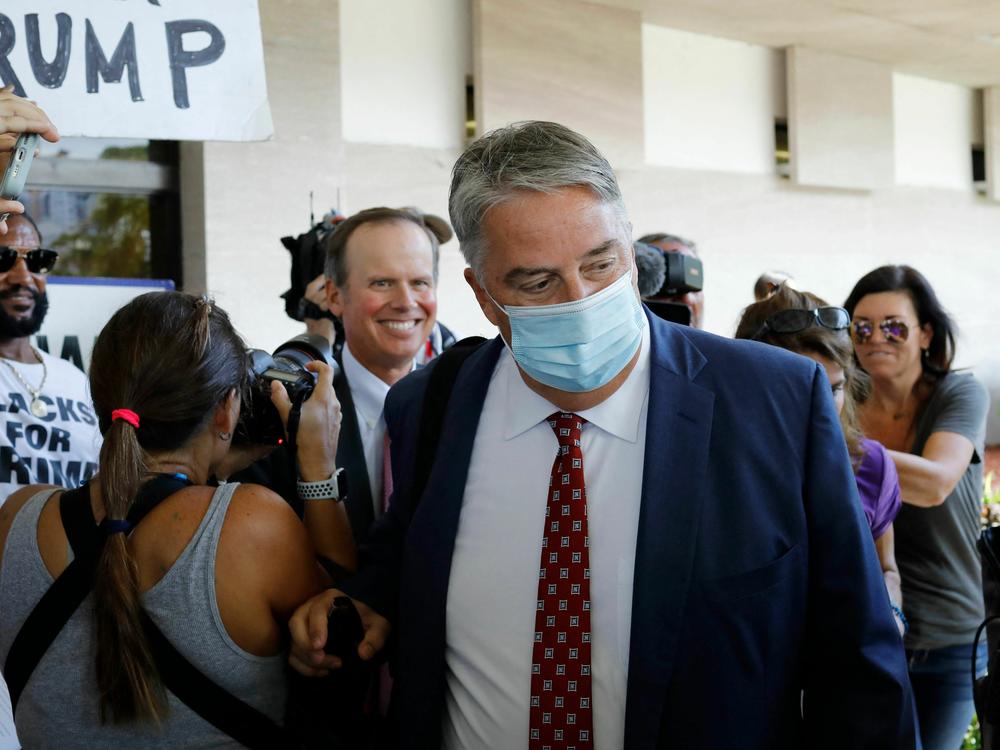Section Branding
Header Content
Trump's lawyer says the Manhattan grand jury's indictment is 'political persecution'
Primary Content
"Political persecution" is how one of Donald Trump's lawyers described a Manhattan grand jury's decision to indict the former president related to his alleged role in a hush money scandal with adult film star Stormy Daniels.
"When President Trump is involved, there's apparently no real rule," Jim Trusty told NPR's Juana Summers. "Everybody breaks rules as prosecutors."
Trusty is one of the lawyers representing the former President in the probe over handling of government records after leaving office, including highly classified material found at Trump's home in Mar-a-Lago.
"I was certainly caught off guard," he told NPR. "I had the hopes that justice was going to prevail early rather than going through this process of having to litigate it in court."
This interview has been lightly edited for length and clarity.
Interview highlights
On whether he has specific information on the charges:
It does give us a little bit of transparency in terms of what we think are going to be the charges. And again, it's early. We've heard rumors of 34 counts or 30 counts, but it appears to be the sum and substance of it relies on a very frail legal notion that you can take this misdemeanor of false recordkeeping and somehow turn it into a felony based on a federal predicate — that's shaky. They have to do that to try to avoid the statute of limitations. Because, remember, this is a case, and I put that in quotes, that the U.S. attorney's office, which is not particularly shy about looking at President Trump, shied away from because they recognized it was not a real crime.
And let me just say, the biggest I mean, there's a lot of issues with it. Obviously, credibility of witnesses is a giant and I think insurmountable issue. And Michael Cohen, is your star witness, a convicted perjurer, disbarred felon. But the legal issue in terms of trying to establish a specific intent to support these misdemeanors is lacking. So we'll see what the indictment looks like, but it won't surprise me at all. There's a very robust, very timely motion to dismiss based on this kind of ridiculous, unheard of, unprecedented legal theory of Alvin Bragg that you can somehow infer a specific intent to defraud when there was none that ever occurred.
On what grounds could lawyers use to file a motion to dismiss the case:
Well, on the grounds that it's a completely political persecution. So, you know, I know that the attorneys on the New York team are going to be aggressive. They're going to jump right in on this when they have a chance to review the indictment. I think they'll recognize that it's in the president's interest and the public's interest to get this to the judge on a motion to dismiss early and to have an opportunity to really stop a historic wrong with this politicized prosecution. So I think you're going to see something —I can't vouch for the exact timing — but I would say measured by days or weeks, rather than weeks or months.
On whether the former President is being held to the same legal standards:
What I would tell you is, you know, we look at it as a situation where nobody is trying to suggest that President Trump should be treated better than any other American citizen, but he certainly shouldn't be treated worse than any citizen. And when you have the kind of targeting, the pre-announced decision by prosecutors that they will find a crime and they will indict. You know, that's upside down. That's not justice in this country. That's not the rule of law. And so all we're looking for is equality under the law and not some sort of supremacy.
Copyright 2023 NPR. To see more, visit https://www.npr.org.

